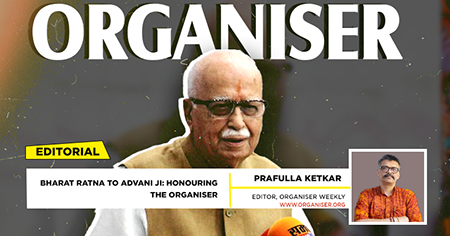“The problems before the nation may be great and many, the danger imminent and grave, but there is no short cut to tide over them. It may be possible to achieve some electoral victories by political alliances and adjustments. Congress may be replaced in some provinces, or even at the centre. But that will not lead to better results unless the newcomers can place before the people principles and programmes in line with the national ethos and inspire them by their example of service and sacrifice. Jana Sangh intends to combat the present situation in this positive manner, and from the support that it is getting from the people, it should not be surprising if its seemingly long cut may turn out to be the shortest cut possible”. –Pandit Deendayal Upadhyaya, The Rationale of Jana Sangh, Organiser (Weekly), January 23, 1960
After the historic Pran Pratishtha ceremony of Ram Lalla in Ayodhya, within ten days, the original political mobiliser for the Ram Janmabhoomi Movement – Lal Krishna Advani Ji, is conferred with the highest civilian award, Bharat Ratna. As Prime Minister Narendra Modi said, “He (Advani ji) continuously fought to free Bharat’s democracy from the prison of one party and one family. He guided everyone, challenged pariwarwaadi vichardhara (Dyanastic ideology), and linked Bharat’s democracy with the all-inclusive and nationalist ideology. Today, we all are seeing the results of that”. There cannot be a better description of the contribution made by the politician Advani Ji. At the individual level, his role as an organiser should be assessed in three phases.
After completing his law and considering his writing ability, it would have been easier for him to start a thriving career after migrating to Bharat from the partitioned part of Sindh in Pakistan. Instead, he chose to dedicate his life to organisational activities. His stint in Rajasthan as a pracharak was not easy, especially on the backdrop of partition and the unjust ban on Rashtriya Swayamsevak Sangh after Gandhiji’s assassination. During that period, considering the organisational need, an educated youth who was not fluent in Hindi accepted the role of an organiser in the Western state. While performing this critical role, whenever necessary, he contributed to Organiser through his reporting and book reviews, as he had mentioned once in a personal conversation.
Due to family compulsions, he decided to take up a job as sub-editor and then Assistant Editor of Organiser, on the advice of Pandit Deendayal Ji. Again, he used his skills to contribute to the organisational expectations. Many people were concerned about the national situation but were not ready to give their byline due to the fear of action by the Congress Government. Organisers had already faced censorship and bans before that. Under K R Malkani ji’s leadership, ‘Advani Ji took up such challenging issues. Getting such opinion articles from the concerned people secretly and taking up many pseudo names to write multiple articles and stories, Advani Ji performed all roles. When Malkani Ji went to the USA on a fellowship, he selflessly assumed the role of editor.
When his role shifted to Bharatiya Jan Sangh (BJS) in Delhi as a political activist, it was mainly to assist Atal ji. The bond of friendship these two developed after a brief introduction by Dr Syama Prasad Mookerjee is rare in public life. Advani realised that Atal Ji was a great orator with better public connect, while Atal ji recognised Advani Ji’s intellectual and organising abilities. Advani Ji and Malkani Ji played a pivotal role in writing against the emergency or challenging the Congress-Communist conglomerate. Advani Ji revived and revised the term ‘pseudo-secularism’, initially used by Father Anthony Elenjimittam in Organiser, while denouncing Nehruvian policies in 1951. Political slogans that shaped the course of political mobilisation in the last four decades, such as ‘Mandir Wahi Banayenge’ and ‘Justice for all, appeasement of none’, were also coined by Advani Ji. Overcoming his initial inhibitions of public speaking, as per the organisational needs, he started addressing Karyakartas, then public rallies. Finally, he embarked on a historic Yatra from Somnath to Ayodhya with his style of communicating with clarity and conviction. He transformed the political scenario of Bharat to the core and brought Hindutva to the centre of national discourse.
In his acceptance statement, he humbly mentioned that Bharat Ratna is an honour for the ideals and principles that he strove to serve the country. As per the direction of Deendayal Ji, Advani Ji placed principles and programmes before the people in line with the national ethos and inspired them with the example of integrity in public life. Organiser is proud of its former Editor, who turned out to be a great organiser for the national cause.




















Comments